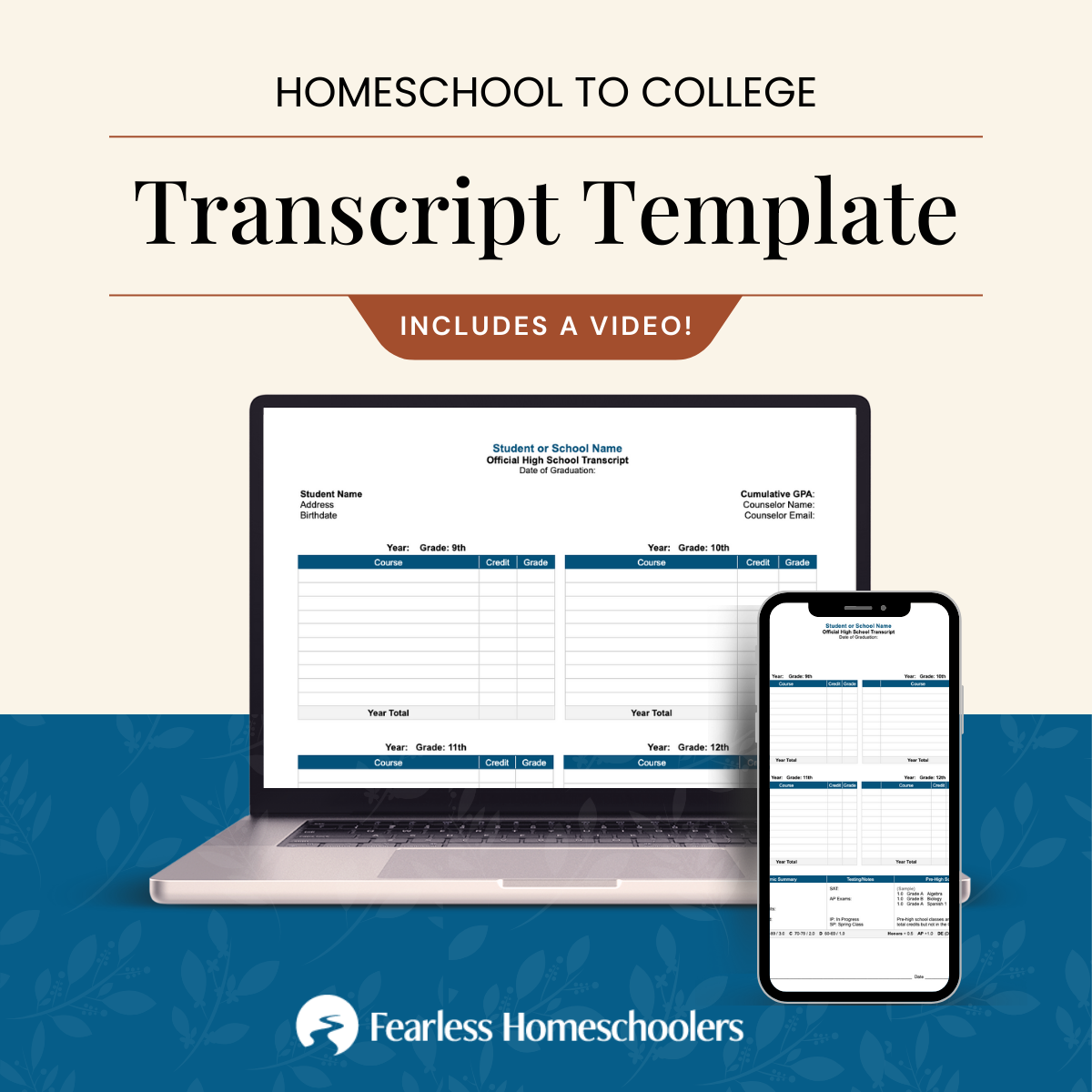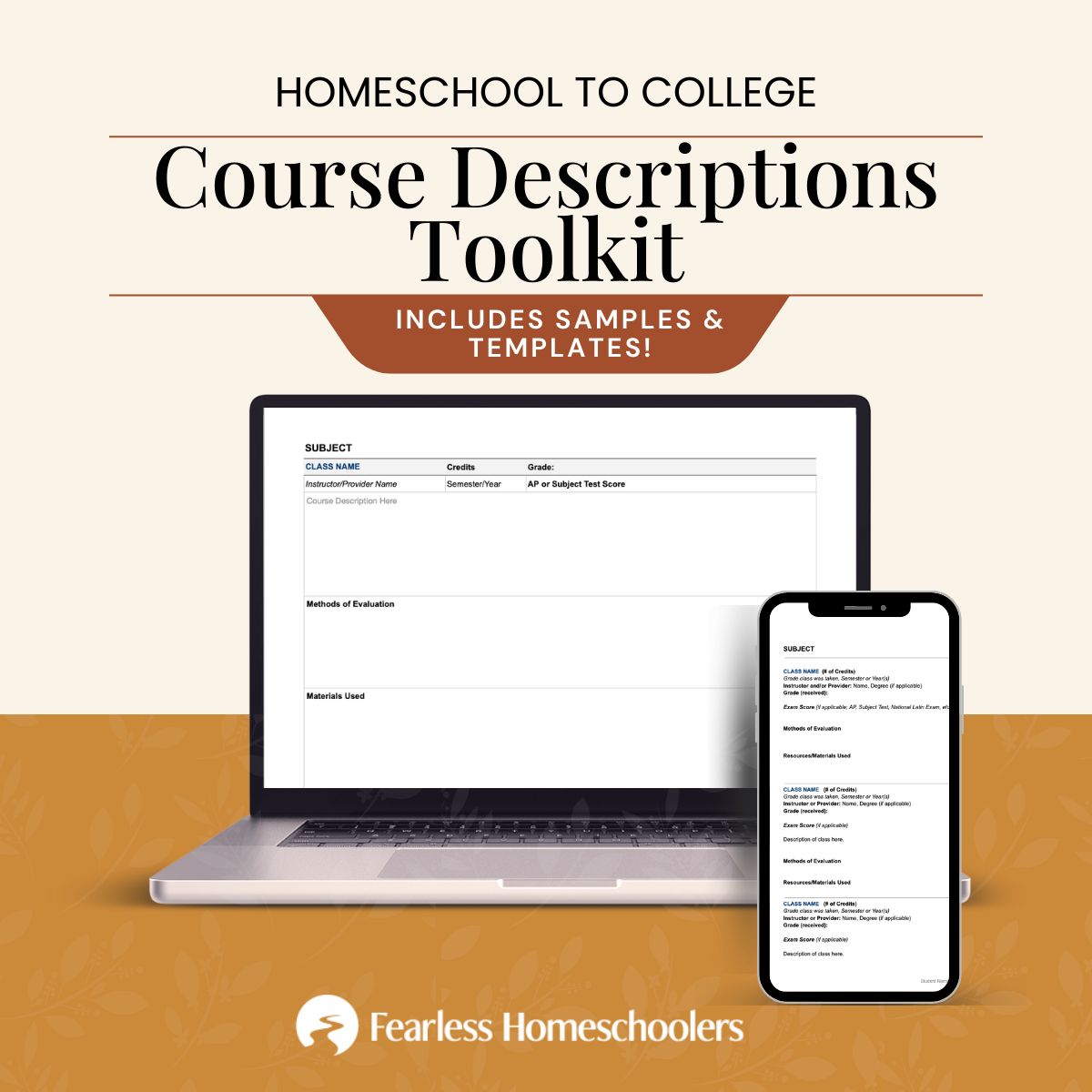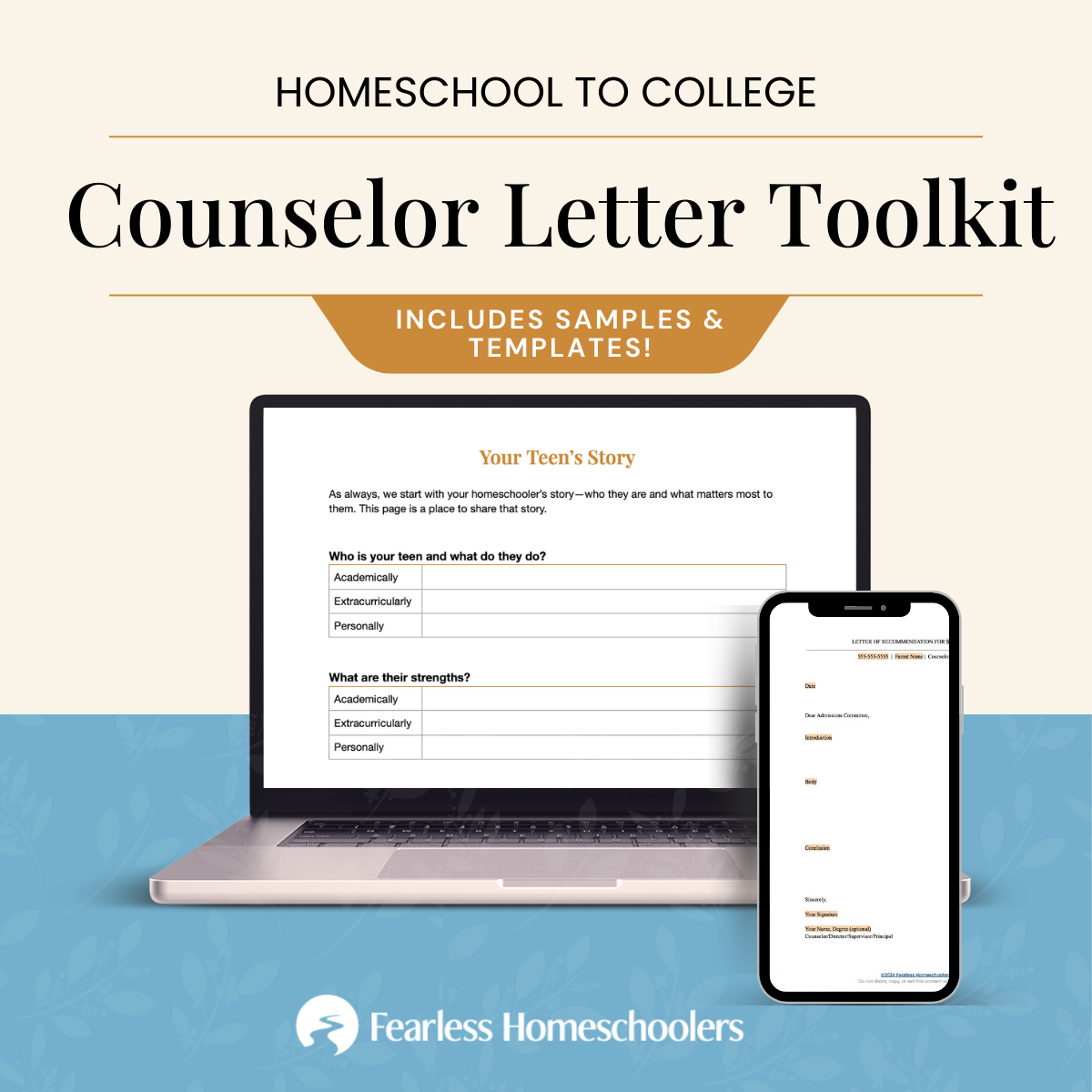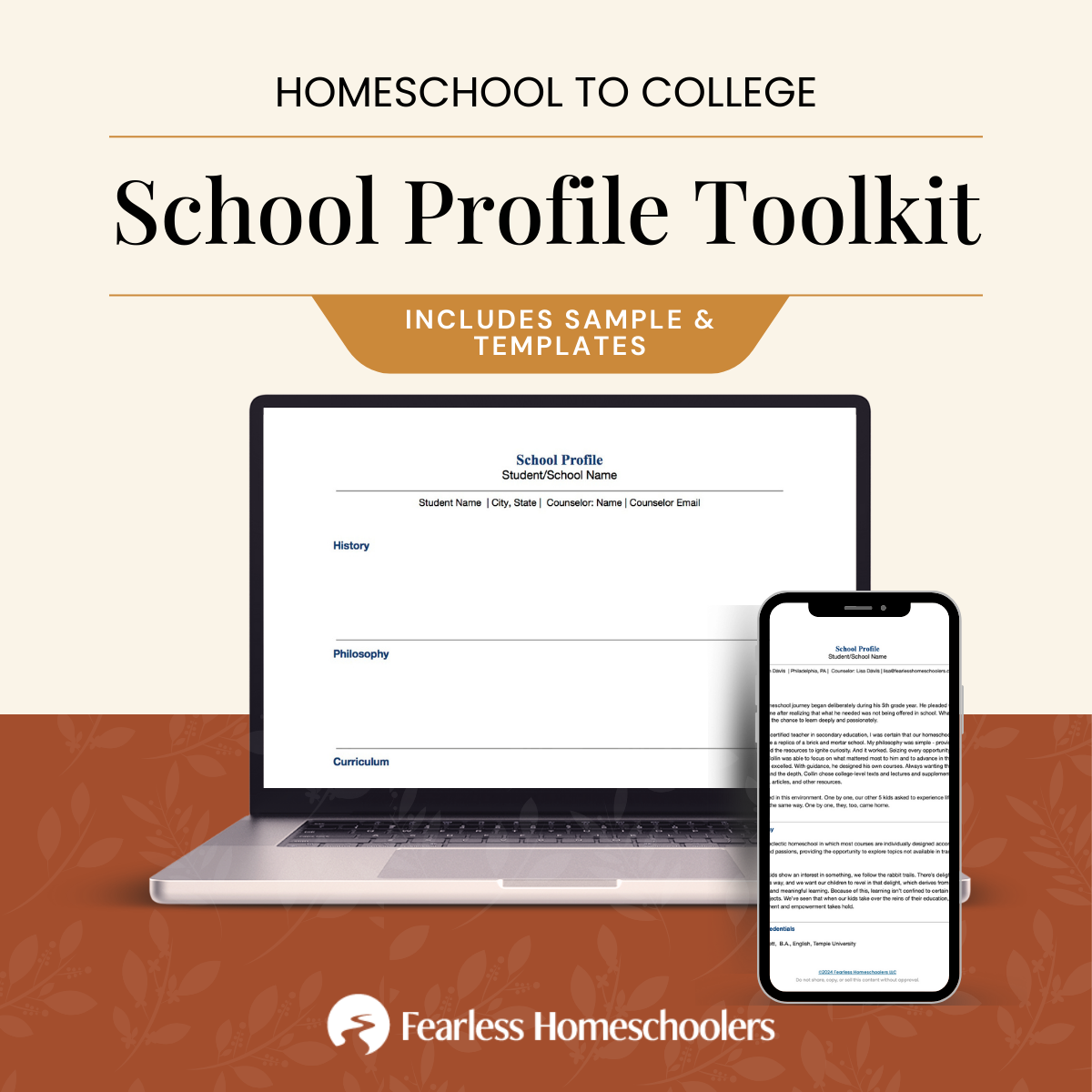The Truth About College Scholarships for Homeschoolers

Find colleges that will love your homeschooler and throw merit scholarships their way.
Have you looked at the price tags of colleges lately?
Take a look at these numbers. These are costs for the 2023–2024 school year.
Penn State University $32,656 (in-state) | $54,110 (out of state)
College of Wooster $73,550
Harvard University $79,450
Remember: Tuition increases every single year!
When looking at price tags, be sure to factor this in your calculations. Colleges usually increase tuition by 2–5% each year. Sometimes more.
Can we say craaazy?
If you cannot afford these costs, you have several choices.
- Don’t let your homeschooler apply. This is certainly an option, but you may miss out on some schools that are a great fit.
- Apply without understanding details about financial aid and merit aid. This may leave you in that horrible situation many families experience after an acceptance from a dream school: “Sorry, hon, you can’t go.”
- Do your research so that you know how to craft a fabulous list not only for your homeschooler but for your family’s pocketbook.
I choose number three.
And you should too.
There are two main kinds of financial assistance for college students.
- Need-based aid.
- Merit aid (merit scholarships or academic scholarships).
Need-Based Aid
Need-based aid (also known as financial aid) is aid based on what the government or the institution calculates to be your need. This is NOT what you think your need is (never lose sight of this).
There are four main kinds of Need-Based Aid:
- Federal Aid. By now, you’ve probably heard of the FAFSA (Free Application for Federal Student Aid). Filling out the FAFSA may qualify you for federal loans, federal grants, and federal work study.
- State Aid. States also provide assistance in the forms of loans, grants, and work study.
- Institutional Aid. This is needs-based aid given by an institution. Some schools use the CSS Profile; some use their own forms. Each institution calculates a family’s need based on their own methodology and priorities.
- Private Aid. This aid is given by certain organizations and corporations.
Each School Calculates Financial Aid Information Differently
- Some schools require ONLY the FAFSA. These schools calculate your need only on information reported on the FAFSA.
- Some schools require the CSS Profile in addition to the FAFSA. The CSS Profile asks more detailed questions. In some situations, the expected cost is much higher than FAFSA only schools.
- Some schools require the FAFSA and their own institution’s financial aid forms.
- Because schools use a variety of methods, you may receive a variety of offers. Sometimes those offers can have a $20,000–30,000 difference.
I recommend running a school’s Net Price Calculator to get estimates. Just remember — these are only estimates and may differ greatly from an actual package.
So why am I spending time explaining financial aid when this is about merit scholarships?
- Because you need to understand the language when going through this process.
- Because you need to understand the financial aid packages when you start receiving them.
- Because you need to understand why you may receive wildly different offers from schools.
Merit Aid
Merit Aid is given to students for academic, artistic, and athletic talent. It can also be given for leadership, community service, and professional experience.
There are two main sources of merit aid.
- Money awarded by an institution.
- Money awarded by a private organization.
Let’s Focus on Merit Awarded by Colleges.
Why?
Because your homeschooler can get the most amount of money directly from colleges!
Merit aid is given to attract high-achieving students who will add value to a college community. Not only does this lure desirable applicants with money, but it increases the school’s ranking and prestige if those students choose that school. A win-win!
Why is merit aid awesome?
Unlike loans, you don’t have to pay it back!
Who should REALLY be looking for merit scholarships?
Families who will not be getting much need-based aid, but need a lot of help covering the costs of college.
11 Truths About Merit Aid (be sure to read these):
1. Not all schools give merit aid. This is worth repeating. Not all schools offer merit aid. If you’re a family who won’t qualify for need-based aid, but can’t afford the hefty price tag, consider schools that offer merit aid.
2. Ivies and similarly selective schools do NOT offer merit aid.
3. Some schools offer only a tiny amount of aid to a tiny percentage of students.
4. Some schools offer a large amount of aid to a large percentage of students.
5. Some schools offer guaranteed awards according to stats. This information is usually laid out very clearly on the college’s website.
6. Some schools use a holistic approach to offer merit to all applicants. Each applicant is equally considered. This is where things get cloudy. There’s no way of knowing if or how much your homeschooler will receive until they’ve gone through the application process.
7. Some schools require extra applications for scholarships. And some of these scholarships may be for certain majors or talents. Info on these scholarships will also be found on a school’s website.
8. Some schools offer competitive scholarship weekends in which applicants attend campus to interview and compete for specific awards.
9. Some schools require the FAFSA to be filled out for merit aid because it is tied to financial need.
10. Most schools guarantee the scholarship for all four years as long as the student maintains a certain GPA or academic standing.
11. Most schools do not “stack” merit aid and financial aid. In other words, merit aid will be applied toward your financial need, not stacked on top of your financial need.
What You May NOT Want to Hear
I’m going to get real here.
For the best chance at merit, your homeschooler should apply to schools where their stats are in the top 25% of that school’s averages.
And?
These schools may not be your homeschooler’s first choice school. Or second. Or third. In fact, they may not be on the list at all.
So you and your homeschooler may need a mind shift. A change in perspective. A new list.
What You DO Want to Hear!
There are AWESOME schools that give merit. And lots of it. Your homeschooler can find a great school at a price that is good for your family.
Don’t leave private schools off the table. You just have to know which ones to put on the table!
So How Do You Begin?
Find the right schools.
- Find schools that give a lot of merit aid to a lot of applicants. Make sure your homeschooler’s stats (scores and GPA) are in the top 25%.
- Find schools that give guaranteed merit aid.
- Find schools that value your homeschooler’s talents, passions, or intended major.
- Look at schools where a student from your geographical area would be most desirable. The midwest is a great area to consider.
What Schools May Consider (not a complete list!)
Why a school offers merit may not always be transparent. Many times it’s based on holistic factors. Many times it’s based on a school’s need to fill a class of diverse students.
- SAT/ACT scores
- AP scores
- GPA
- Course Rigor
- Student Ranking
- Demonstrated Interest
- Interview
- Essay(s)
- Supplemental questions
- Talent
- Leadership
- Volunteer Work
- Geography (where you live)
- Ethnic background
4 Ways to Increase Your Homeschooler’s Merit Aid Chances
1. Plan a high school using outside evidence. This may include online classes, dual enrollment, AP exams, SATs. Not only do these provide more context for the admissions officers, but it also increases your homeschooler’s chances for a great letter of recommendation (also important for merit).
2. Create thorough and professional homeschool documents. Whether a school “asks” or not, submit a transcript, course descriptions, school profile, and counselor letter of recommendation. This shows you took your homeschooler’s education seriously and they should, too.
3. Weight the GPA — some schools use weighted grades for scholarship purposes.
4. Cast a wide net! Apply to a variety of schools because you just never know what kinds of awards you will get. It also allows you to compare packages and make the best decision for your family.
Are you Ready?
Don’t let AWESOME schools pass you by.
The hardest part will be changing your mindset about which schools should be on the list. Think outside the box (like you always do). Challenge the status quo (like you always do).
Do your research. Be transparent with your homeschooler. And start falling in love with schools that will be throwing money your way!
Your Turn
What has surprised you most about the 11 truths? Share in a comment below!






